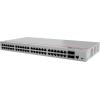-
$
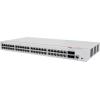
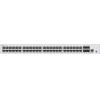
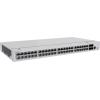
Huawei S310-48T4X è uno switch gestito della serie eKitEngine. È dotato di 48 porte Gigabit Ethernet (10/100/1000 Mbps) e 4 slot SFP+ (10 Gbps). Fornisce gestione Layer 2 e funzioni Layer 3 di base e supporta i protocolli Spanning Tree (STP / RSTP / MSTP) e il moderno standard ERPS (Ethernet Ring Protection Switching). È dotato di una funzione Smart Link che consente di creare una connessione di backup. È possibile collegare la serie S310 a più switch di aggregazione utilizzando connessioni multiple, garantendo così il funzionamento della rete in caso di danni a uno dei cavi. Il prodotto offerto si distingue per le funzioni di sicurezza avanzate, è protetto da vari tipi di attacchi (tra cui DoS, spoofing IP/MAC o SYN flood), utilizza il DHCP Snooping e ricorda le voci ARP, il che protegge dallo spoofing ARP. Un ulteriore vantaggio è il supporto iStack: più switch possono essere virtualmente impilati in un unico dispositivo. La gestione avviene tramite interfaccia utente Web, CLI o SNMP. Il dispositivo supporta la gestione cloud e l'app eKit. Lo switch dispone di un alimentatore CA integrato e di un raffreddamento attivo con regolazione intelligente della velocità della ventola. L'S310-48T4X è progettato per essere utilizzato come switch principale (core) nelle reti basate sulle soluzioni eKitEngine. Grazie all'ampia gestione e alle numerose funzionalità, dimostrerà il suo valore anche in altre applicazioni, non solo in combinazione con gli access point.
La nuova versione del software (R24 o successiva) riduce significativamente il tempo di avvio, migliora la regolazione delle ventole e aumenta notevolmente le capacità di gestione dall'interfaccia Web. Consente di configurare la maggior parte dei parametri tramite un'interfaccia grafica, mentre in precedenza molte funzioni erano disponibili solo dalla CLI.
Si consiglia di aggiornare i dispositivi alla versione R24! Il software può essere richiesto al nostro servizio di assistenza - support@cdr.pl.48 porte Gigabit Ethernet, 4 slot SFP+
Lo switch è dotato di 48 porte Gigabit Ethernet (10/100/1000 Mbps) e quattro slot SFP+ (10 Gbps). Il throughput di commutazione è di 176 Gbps e la velocità di inoltro dei pacchetti è di 131 Mp/s. Gli slot SFP+ forniscono velocità elevate fino a (10 Gbps), consentendo di collegare tra loro diversi segmenti di rete o dispositivi ad alte prestazioni come i server.
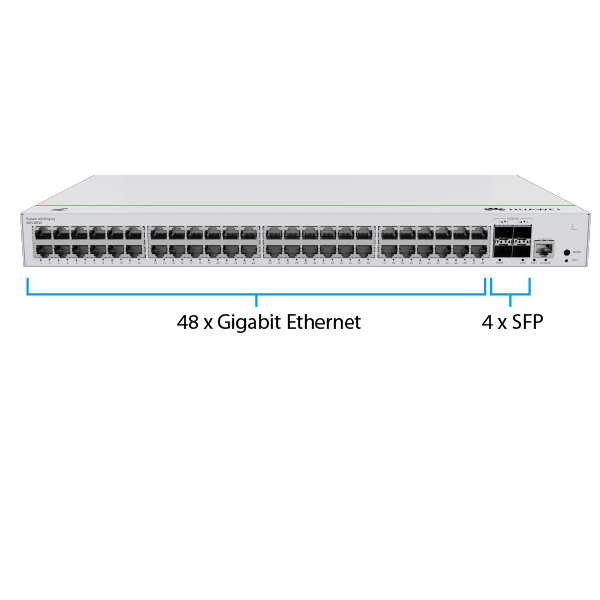
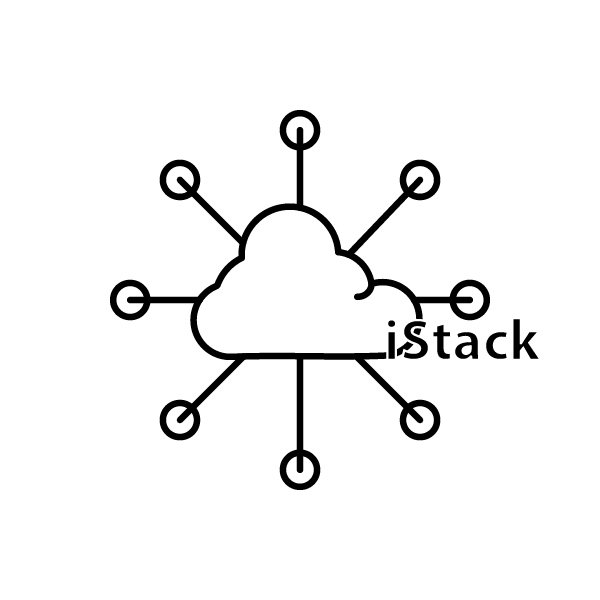
Gestione Layer 2+, iStack
Il dispositivo supporta pienamente la gestione Layer 2 e dispone inoltre di funzionalità Layer 3 di base, come il routing statico. Supporta VLAN, multicast (IGMP Snooping, MLD Snooping), funzionalità QoS e liste di controllo degli accessi (ACL). Supporta i protocolli Spanning Tree (STP / RSTP / MSTP) e il moderno standard ERPS (Ethernet Ring Protection Switching) definito in IUT-T G.8032.
Lo switch offre una sicurezza di rete essenziale. Protegge dagli attacchi DoS - SYN flood, Land, Smurf e ICMP flood. È inoltre protetto dagli attacchi diretti dall'utente: attacchi al server DCHP, spoofing IP/MAC, flood di richieste DHCP o DHCP CHADDR.
La serie S310 supporta iStack, che consente di impilare logicamente più switch in un unico switch virtuale. Questo semplifica la gestione della rete e consente di creare connessioni di backup aggiuntive per proteggersi da eventuali guasti.
La gestione avviene tramite GUI Web, CLI o SNMP (v1, v2c, v3) / SSH2.0. I dispositivi della serie S310 possono essere gestiti anche nel cloud, nel qual caso è possibile utilizzare l'app Huawei eKit.
Applicazione
Grazie alla sua ricca gestione, l'S310-48T4X è perfetto come switch principale in vari tipi di reti. L'uso di 48 porte consente di collegare molti dispositivi che non richiedono alimentazione PoE. Nelle reti di uffici più piccoli, l'S310-48T4X può fungere da unico switch. È possibile utilizzare gli slot SFP+ per collegare switch di aggregazione o dispositivi critici come un server NAS o un router.
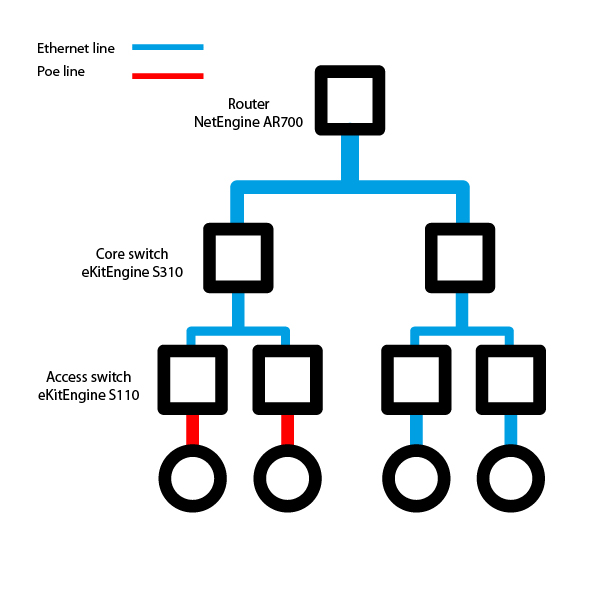
Caratteristiche
| Huawei S310-48T4X | |
| Capacità di commutazione | 176 Gb/s |
| Velocità di inoltro dei pacchetti | 131 Mp/s |
| Porte |
48x gigabit Ethernet 10/100/1000 Mb/s 4x SFP+ (10 Gb/s) |
| Dimensioni | 43.6 mm x 442 mm x 220 mm |
| Altezza | 1U |
| Peso | 3,59 kg |
| Metodo di alimentazione | Adattatore CA incorporato |
| Tensione di ingresso nominale | 100 - 240 V AC, 50/60 Hz |
| Intervallo di tensione d'ingresso | 90 - 290 V AC, 55/65 Hz |
| Consumo massimo di energia | 44,3 W |
| Volume |
A temperatura normale: 46,6 dB (A) Ad alta temperatura: 54,3 dB (A) |
| Temperatura di funzionamento consentita | Da-5 a 50 C |
| Temperatura di stoccaggio consentita | Da -40 a 70 C |
| Umidità ammessa | 5%-95% senza condensa |
| Protezione da sovratensione delle porte di servizio | ±10 kV |
| Protezione da sovratensione dell'attacco di alimentazione | ±6 kV |
| Raffreddamento | Regolazione attiva e intelligente delle velocità del ventilatore |
| Caratteristiche del software | |
|---|---|
| Tabella indirizzi MAC |
Automatico MAC address learning / aging Massimo 16K indirizzi MAC Inserimento di indirizzi MAC statici / dinamici / blackhole Filtraggio dell'indirizzo MAC di origine Limite di indirizzi MAC memorizzati per interfaccia |
| VLAN |
4094 VLAN Voice VLAN MUX VLAN Assegnazione di VLAN in base a indirizzo MAC, protocollo, sottorete IP, policy e porte VLAN stacking |
| Ethernet switching |
Topologia Smart Link tree e Smart Link multi-instance G.8032 ERPS (Ethernet Ring Protection Switching) STIP (IEEE 802.1d), RSTP (IEEE 802.1w), MSTP (IEEE 802.1s) Protezione BPDU / root / loop Tunnel BPDU |
| Multicast | IGMP v1 / v2 / v3, IGMP v1 / v2 / v3 snooping e MLD snooping |
| Routing IP |
Routing statico e PBR (policy-based routing)
Fino a 512 FIBv6 |
| Caratteristiche IPv6 |
ND (neighbor discovery) PMTU IPv6 ping, IPv6 tracert, IPv6 telnet |
| Stabilità |
LACP (Link Aggregation Control protocol) VRRP (Virtual Router Redundancy Protocol) BFD (Bidirectional Forwarding Detection) LLDP (Link Layer Discovery Protocol) |
| Modalita' QoS / Controllo di accesso ACL |
Limite di traffico basato su inbound / outbound per porta Inoltro dei pacchetti Two-rate three-color CAR, instradamento del traffico basato sulla porta 8 code per porta Algoritmi di accodamento: DRR, SP e DRR+SP Re-marking delle priorità 802.1p e DSCP ai pacchetti Filtraggio dei pacchetti Layer 2 - Layer 4, filtraggio dei frame errati in base all'indirizzo MAC di origine, all'indirizzo MAC di destinazione, all'indirizzo IP di origine, all'indirizzo IP di destinazione, al numero di porta TCP/UDP, al tipo di protocollo o alla VLAN. Limite di larghezza di banda per coda e traffic shaping per porta Network slicing (VLAN/VXLAN) |
| Sicurezza |
Gestione gerarchica degli utenti e protezione con password Protezione contro gli attacchi DoS, ARP e ICMP Assegnazione di indirizzo IP, indirizzo MAC, ID porta e ID VLAN Isolamento delle porte, sicurezza delle porte, sticky MAC Autenticazione IEEE 802.1X e limite del numero di utenti per porta Metodi di autenticazione multipli tra cui AAA, RADIUS, HWTACACS e NAC SSH v2.0 HTTPS Protezione della CPU Whitelist e blacklist Client DHCP, relè DHCP, server DHCP, snooping DHCP Client DHCPv6, relay DHCPv6 |
| Gestione e manutenzione della rete |
iStack Gestione del cloud basata su NETCONF/YANG VCT (Virtual cable test) Gestione e manutenzione remota della rete tramite Telnet SNMP v1/v2/v3 RMON Gestione tramite sistema web HTTPS LLDP/LLDP-MED Log e allarmi di sistema IEEE 802.3az EEE (Energy Efficent Ethernet) Port mirroring Espansione della rete tramite registration query center |
| Interoperabilità |
VBST Compatibilità con PVST, PVST+ e RPVST |






 Polski
Polski English
English Italiano
Italiano Español
Español Čeština
Čeština Српски
Српски Deutsch
Deutsch Ελληνικά
Ελληνικά Slovenský
Slovenský

